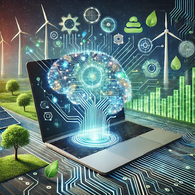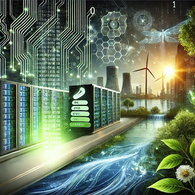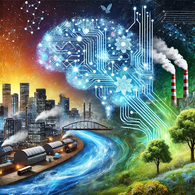

About the clean-IT Course Seriesclean-IT
Digital technologies are indispensable to achieving Sustainable Development Goals and reducing carbon emissions in many sectors. Yet, computer systems themselves have an immense energy requirement for their countless devices, data centers, applications and global networks. The shift to digital in living, learning and earning has brought us closer to the time when digitization will have a major negative impact on the climate. Since digitization has many important benefits, research, teaching and policy must strategically prioritize to deliver digitization with less energy consumption, increase algorithmic efficiency so that people and the planet thrive, and make “Sustainability by Design” the new leading paradigm in digital engineering worldwide.
Self-paced courses
You now have the opportunity to earn a Record of Achievement for many courses in self-paced mode. Learn more about our course reactivation option.
This course explores the critical intersection of AI and sustainability, highlighting how technological advancement can align with environmental responsibility. It offers insights into the dual nature of AI, noting its potential for increasing efficiency and driving sustainable innovation, while also acknowledging the significant energy consumption involved in training and applying AI models. In this course, we are not only examining the paradox of AI and sustainability but also provides actionable recommendations for incorporating sustainability into AI application development. By examining AI's transformative role and its environmental impact, the course offers a comprehensive understanding of how AI can be harnessed to support global sustainability goals effectively.
This course is part of the Sustainability in the Digital Age series, a collaborative project between colleagues from Stanford University, SAP and the Hasso Plattner Institute.
- Self-paced since Jun 26, 2025
- Record of Achievement
- en
- de, en
Digital systems offer a great opportunity to significantly reduce carbon emissions and can contribute to the efficient use of energy. However, all systems also need energy. This area of tension is addressed in the course: Sustainability in the digital age - Energy-Efficient Software Development. To effectively reduce the carbon footprint of digitalization, it is necessary to apply algorithmic efficiency and sustainability by design as guiding principles in digital engineering. We will introduce strategies to develop software that prioritizes minimized energy consumption through optimal coding and green testing practices. We will look at how the CO2 emissions of operating software applications can be measured and calculated. How to measure the performance and energy consumption of Large Language Models will be covered as well. Further we share approaches how to use advances in hardware technology and operate digital systems efficiently in data centers based on eco-friendly and cost-effective capacity management strategies.
This course is part of the Sustainability in the Digital Age series, a collaborative project between colleagues from Stanford University, SAP and the Hasso Plattner Institute.
- Self-paced since Apr 8, 2025
- Enterprise Computing, Cloud and Operating Systems, Programming
- Record of Achievement
- en
- de, en
Artificial Intelligence (AI) offers transformative potential across industries, but its development and deployment come with environmental costs. The course covers topics such as the carbon footprint of AI models, methods for measuring and reporting environmental impacts, and challenges in estimating the sustainability of AI technologies. Students will gain insights into energy and carbon accounting, along with case studies demonstrating how AI’s environmental footprint is assessed. The course aims to provide a comprehensive understanding of the relationship between AI and the environment, equipping learners with knowledge to contribute to more sustainable AI practices.
This course is part of the Sustainability in the Digital Age series, a collaborative project between colleagues from Stanford University, SAP and the Hasso Plattner Institute.
- Self-paced since Mar 18, 2025
- Big Data and AI
- Record of Achievement
- en
- de, en
Efficiency in computer science often refers to the runtime or memory usage, that a certain algorithm needs to produce an output. However, efficiency can also describe the amount of energy, that is consumed by the hardware during the runtime of an algorithm.
This course explains the relevant computer architecture components, as well as different coding techniques, that allow computer scientists to design and program energy efficient algorithms. Participants will learn how intrinsic functions work and how they can be applied to an algorithm to reduce its energy consumption. In addition, the course presents a hands-on approach to measuring energy consumption of programs using the Intel VTune Profiler tool. In contrast to the existing clean-IT courses on openHPI, this course provides a deeper dive into specific, energy efficient, architecture coding techniques.
- Self-paced since Apr 26, 2023
- Programming
- Record of Achievement
- en
- en
This two-week free course is about resource-efficient software engineering. We'll discuss how to apply climate-friendly decisions and actions along the life cycle of software development and their context. In the first part of the course, we will address the area of tension between climate and digitization. We will look at how IT causes CO2 emissions and how IT technologies can save CO2 emissions. What are the possibilities in software development to make processes more sustainable? What are the main problems in software development? How can they be solved? While the first part is theory oriented, the second part will be practical and will have specific examples. Therefore, we will give you some detailed insights into programming resource-efficient software.
- Self-paced since Apr 13, 2022
- Programming
- Record of Achievement
- en
- en
Digitalization is a game changer in the pursuit of a sustainable future. The latest digital technologies and applications like cloud, AI, and mobile devices enable us to achieve the Sustainable Development Goals and reduce carbon emissions in many sectors. Yet computer systems themselves have an immense energy requirement for their countless devices, data centers, applications and global networks. To effectively reduce the carbon footprint of digitalization, it is necessary to apply algorithmic efficiency and sustainability by design as guiding principles in digital engineering. The clean-IT Forum is the international platform to exchange ideas, recent research findings and applications to make digital technologies more energy-efficient.
- Self-paced since Mar 31, 2021
- Big Data and AI, Cloud and Operating Systems
- Confirmation of Participation
- en
- de, en





